How many times have you been minding your own business, reading a book or walking down the hall only to be pounced on by your mischievous cat? Though domesticated, these animals are still hunters at heart, and movement is essential to their quality of life. Though we wish our feline companions could stay sprightly and in perfect physical condition for their entire lives, diseases, traumatic injury, and other health issues can slow them down and making moving around difficult or even painful.
To further complicate things, cats don’t like to show weakness. They may hide the fact that they’re in pain, or just slowly start losing interest in the activities that once stimulated them. It’s up to pet parents to keep a close eye on our furry friends, always on the lookout for potential health issues that could impact a cat’s ability to move. We’re all about keeping pets mobile and empowering pet owners to take stellar care of their animals here at K9 Carts. Here are some common mobility issues that may affect your kitty in the future, as well as some tips for keeping him or her moving.
Mobility Issues and Health Conditions
1. Arthritis
As cats age, the cartilage between their bones breaks down, which can lead to health issues like arthritis, a degenerative joint disease. The condition tends to affect the elbow joint but can cause pain and inflammation in other joints as well. You may notice an arthritic cat moving stiffly, appearing lame, or hesitating to run or jump.
2. Obesity
Some people might think a chubby cat is “cute,” but that extra fat can be dangerous! Obese cats have a harder time staying active, moving around, and even cleaning themselves. Additionally, the extra strain put on their joints can cause further health issues. If you notice your cat looking heavier than normal and refusing to move much, visit your veterinarian for a checkup. While the cause of the weight gain is probably just overfeeding, your vet will want to eliminate the possibility of a thyroid issue.
3. Fractured Back
A cat’s spine is made up of dozens of bones that keep the all-important spinal cord safe. Injury to these bones can put pressure on the spinal cord, resulting in pain, incontinence, and even paralysis. This type of injury usually results from trauma such as being hit by a car, falling from a high point, or being bitten by a dog. If you think your cat has suffered a back or spine injury, get medical attention as quickly as possible. But take care transporting your cat—jostling the injury too much can cause more damage.
Addressing Mobility Issues in Cats
Keep Up Preventative Care
Keep your cat in great physical condition by feeding her a healthy diet, keeping her nails trimmed, and offering plenty of affection and stimulation! And instead of addressing problems as they occur, take her to a veterinarian for regular checkups to catch health issues before they begin to affect your kitty’s daily life. While you’re better positioned to notice changes in your cat’s day-to-day behavior, your vet will be able to identify health problems such as cancer that aren’t outwardly obvious.
Make Your Home Accessible
If you notice your senior cat moving more slowly or struggling to leap up to places she once reached with ease, it’s time to make a few small changes around the house. These additions will depend entirely on your cat’s personal preferences and physical needs, so don’t go ripping up your floorboards before you take stock of what will actually benefit her most! A cat who loves to lounge on the couch with you, for example, might enjoy a short ramp or step that makes it easier for him to get up there without jumping. You can also make life easier on an arthritic cat by covering your hardwood or tile floors with an area rug or runner to help him get around the house safely. Consider also providing your feline friend with a litter box with lower sides to make doing his business easier and more comfortable.
Introduce a Cat Wheelchair
Some mobility issues can be managed and even mitigated with the help of a cat wheelchair or other mobility aid. Cats living with a fractured back, cerebellar hypoplasia, arthritis, old age, front or rear amputation, or disc disease are great candidates for a customized cart. We designed our cat wheelchair with an ultra-light frame made just for our feline friends. With an adjustable support system, each wheelchair is guaranteed to fit the recipient, helping to stabilize the animal, relieve stress on the spine, and get him or her moving again. Our carts are also great tools for cats needing post-surgical rehabilitation for disc, knee, and hip surgery!
Get Your Pet Rolling with K9 Carts
It can be stressful to take responsibility for an animal, even a perfectly healthy one. Watching that beloved cat or dog lose mobility can leave a pet owner feeling helpless and heartbroken. We’re here to give your pet a new lease on life! At K9 Carts, we’re proud to offer customized pet wheelchairs built for a variety of companion animals. Give us a call today to learn more about how we can help your pet regain mobility and quality of life.
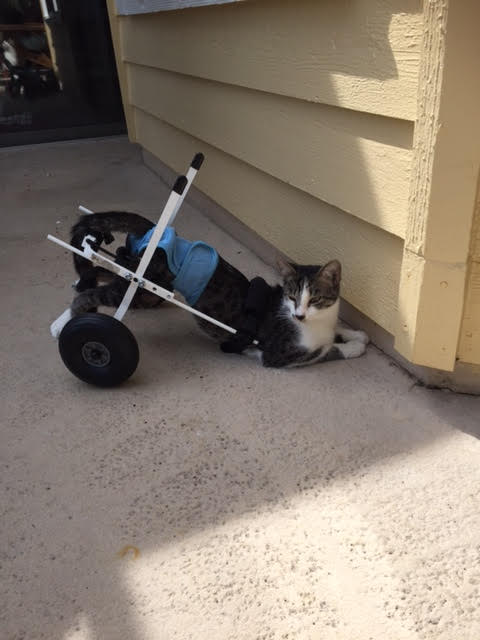


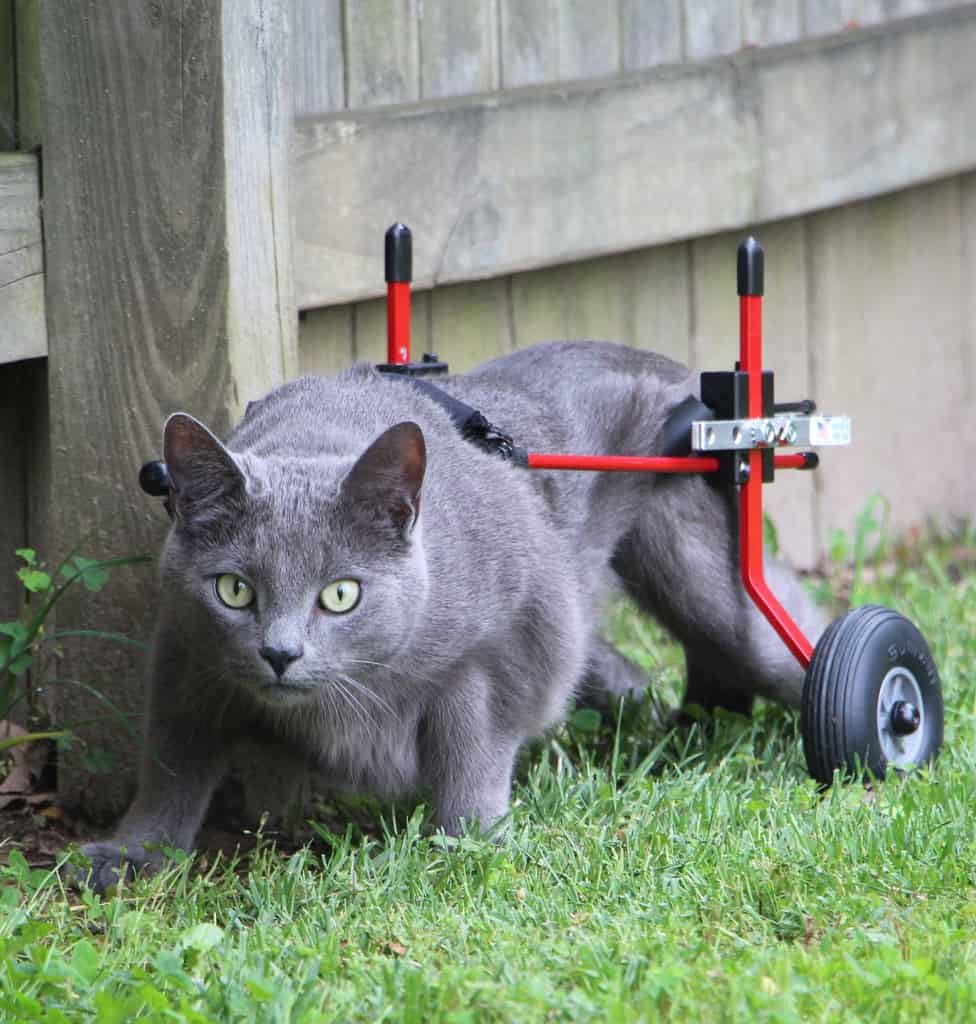
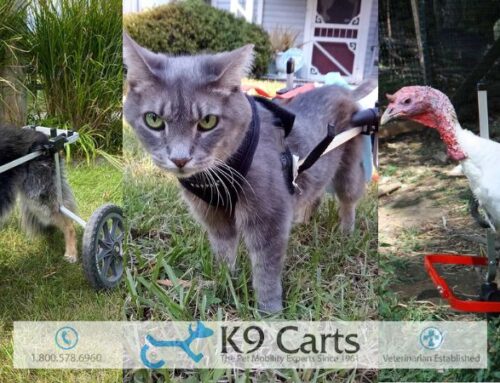
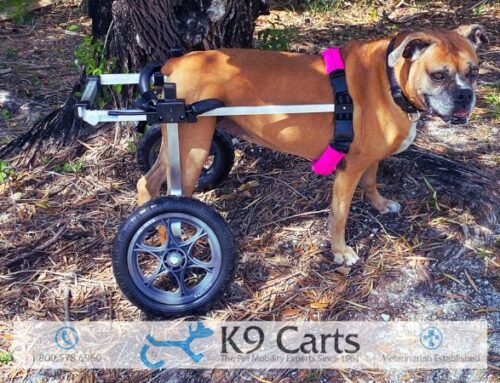
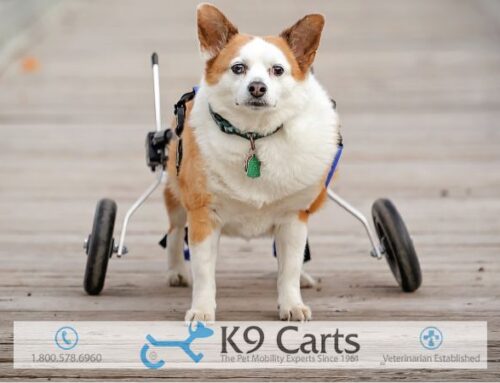
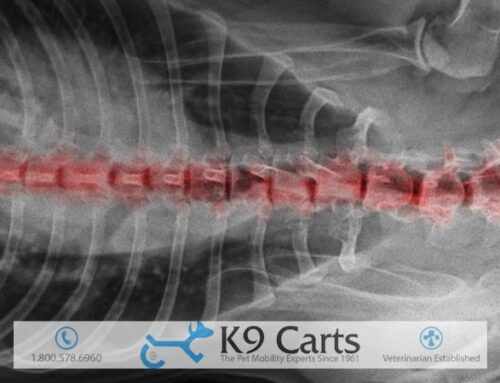
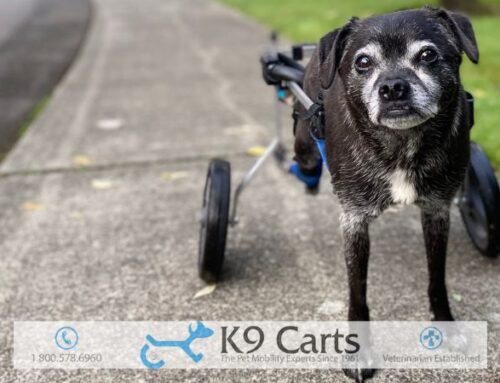
Leave A Comment